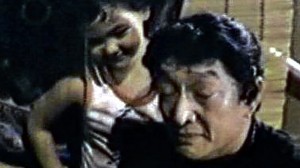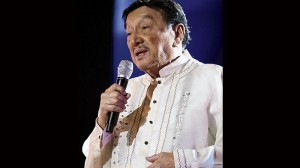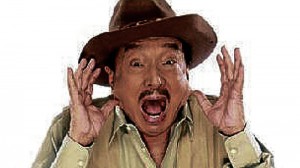COMEDY king Dolphy fought the good fight to survive his many illnesses last month but, just as it appeared that he was on his way to recovery, he expired shortly before his 84th birthday. He left not just his loved ones, but the entire nation in a state of stunned bereavement, and he will be sorely missed.
Now that he’s passed away, we who mourn his loss should honor him in various ways. Today, our way is to share our thoughts on why Dolphy was so special and why he was so universally loved.
Rare combination
It isn’t just because he was a funnyman—after all, many popular comedians have left us without causing such grief. In our view, it’s due to his rare combination of personal and professional qualities, never before distilled and instilled in a single performing artist.
First, the professional aspect of Dolphy’s career arc and filmography: He did many things in the course of his career, but consistently chose roles that projected him as the local movie screen’s Everyman.
Thus, he “represented” the “ordinary” viewers watching and fully empathizing with him in the dark. In effect, therefore, he forged a personal bond with his viewers, who lived, loved, laughed and cried along with the characters he portrayed.
Next, he made sure, in his choice of roles, to play a wide range of people, so predictability, satiety and boredom wouldn’t stultify his performances, and his hold on viewers.
Yes, his gay characters were among his most popular rib-ticklers, but he also portrayed the quintessential Filipino Everyman, John Puruntong—and a veritable grinning gallery of other types—the Pinoy version of James Bond, spoofs of cowboys, a gender-bending Darna, and localized takes on foreign film hits, trendy TV commercials, popular songs—etc.
Dolphy reigned as the country’s King Comic for many decades because he had his ear on the ground and his finger on the pulse of viewers’ changing interests and fads. To him, the worst sin a performer could commit was to rest on his laurels.
That’s why he was loved, not just by loyal oldtimers, but by successive generations of viewers. Yes, he was old, but certainly not over the hill, because even young people could relate to his jokes—because he made it a point to relate to them.
An added “bonus” is the fact that Dolphy was famous for his, ah, admiration of beautiful women. Not drop-dead handsome himself, he “won” some of the loveliest ladies on the silver screen—and gave the “ordinary” guys in the audience yet another fantasy made flesh to vicariously empathize with!
—Imagine, the movies’ most colorful and psychedelic portrayer of flaming fairies was in fact a ladykiller of “deadly” repute and achievement? Amazing.
On Dolphy’s appeal as a person rather than a performer, what stood out was his genuine humility. He performed not to boost his stock as a star, but to make his viewers happy.
Aside from his performances, he was also innately generous, making a point of sharing his “blessings” and “paying it forward” to help a number of beneficiaries. Some observers say that he was sometimes too generous that he spoiled some recipients of his bounty in the process, but you certainly couldn’t fault the man for his innate impulse to help and share.
All of these diverse qualities and impulses made Dolphy Dolphy, hence the love and bereavement currently being expressed by a grieving nation. —When comes such another?




